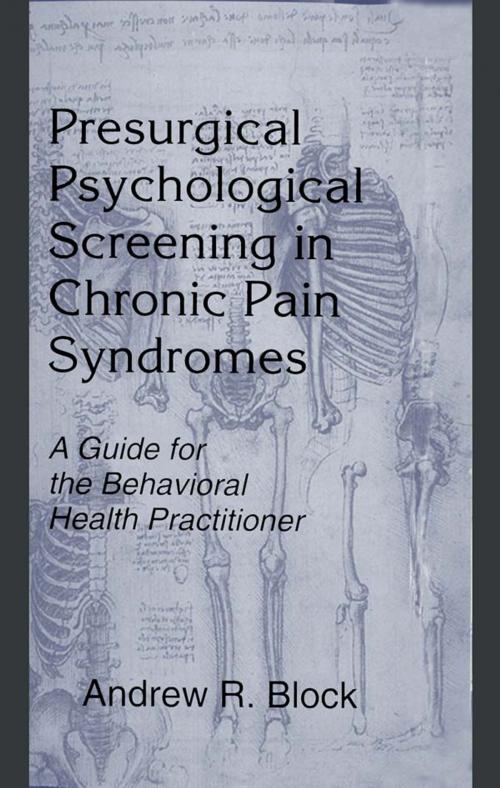Presurgical Psychological Screening in Chronic Pain Syndromes
A Guide for the Behavioral Health Practitioner
Nonfiction, Health & Well Being, Psychology| Author: | Andrew R. Block | ISBN: | 9781317778721 |
| Publisher: | Taylor and Francis | Publication: | February 25, 2014 |
| Imprint: | Psychology Press | Language: | English |
| Author: | Andrew R. Block |
| ISBN: | 9781317778721 |
| Publisher: | Taylor and Francis |
| Publication: | February 25, 2014 |
| Imprint: | Psychology Press |
| Language: | English |
Pain is an unfortunate daily experience for many individuals. Chronic pain -- lasting six or more months -- is suffered by approximately 30% of the population in the United States. These individuals wake up, function during the day and go to sleep, trying to keep pain at a minimum while, at the same time, maintaining some quality of life. They may make frequent visits to the doctor and the pharmacy. When they find relief, it is usually short-lived and comes at a cost such as dependence on narcotic medications or complete limitation of activity. Pain often becomes the central point of their existence.
This practice guide describes an approach to psychological evaluation of the chronic pain patient who is being considered for surgery. A large body of research is accumulating which demonstrates that the outcome of surgical procedures aimed at chronic pain relief can be strongly influenced by psychological and emotional factors. This approach, termed "presurgical psychological screening" (PPS) uses interview and testing techniques to identify emotional, behavioral, and psychosocial difficulties which have been demonstrated to negatively impact surgical outcome. Studies show that even patients with clearly identifiable pathophysiology may respond poorly to surgery, due to issues such as pain sensitivity, medication dependence, rewards for pain behavior and personality style. Thus, some insurance carriers, rehabilitation nurses and state worker's compensation systems are encouraging, or even requiring, presurgical psychological screening in cases of surgery designed to relieve chronic pain.
The first to present a comprehensive, unified approach to PPS in chronic pain syndromes, this text is designed to provide the behavioral health practitioner, as well as the trainee, with all the tools and information necessary to conduct PPS evaluations. It identifies a multitude of risk factors for poor surgical outcome and reviews research associated with each risk factor. Hands-on techniques for eliciting information from the patient about risk factors is also detailed. Toward this end, the practice guide also contains a number of forms and session outlines which can be directly utilized, or which can be altered to fit readers' needs. Models for weighing and combining surgical outcome risk factors are also provided. Thus, practitioners are able to reach valid and reliable predictions of surgical results. Finally, the text provides outlines of psychological interventions which can facilitate surgical outcome as well as surgical treatment alternatives. Upon completion of this practice guide, readers should be able to begin providing PPS evaluations which are scientifically valid, clinically sound, and which result in significant overall improvement in the treatment of chronic pain syndromes.
Pain is an unfortunate daily experience for many individuals. Chronic pain -- lasting six or more months -- is suffered by approximately 30% of the population in the United States. These individuals wake up, function during the day and go to sleep, trying to keep pain at a minimum while, at the same time, maintaining some quality of life. They may make frequent visits to the doctor and the pharmacy. When they find relief, it is usually short-lived and comes at a cost such as dependence on narcotic medications or complete limitation of activity. Pain often becomes the central point of their existence.
This practice guide describes an approach to psychological evaluation of the chronic pain patient who is being considered for surgery. A large body of research is accumulating which demonstrates that the outcome of surgical procedures aimed at chronic pain relief can be strongly influenced by psychological and emotional factors. This approach, termed "presurgical psychological screening" (PPS) uses interview and testing techniques to identify emotional, behavioral, and psychosocial difficulties which have been demonstrated to negatively impact surgical outcome. Studies show that even patients with clearly identifiable pathophysiology may respond poorly to surgery, due to issues such as pain sensitivity, medication dependence, rewards for pain behavior and personality style. Thus, some insurance carriers, rehabilitation nurses and state worker's compensation systems are encouraging, or even requiring, presurgical psychological screening in cases of surgery designed to relieve chronic pain.
The first to present a comprehensive, unified approach to PPS in chronic pain syndromes, this text is designed to provide the behavioral health practitioner, as well as the trainee, with all the tools and information necessary to conduct PPS evaluations. It identifies a multitude of risk factors for poor surgical outcome and reviews research associated with each risk factor. Hands-on techniques for eliciting information from the patient about risk factors is also detailed. Toward this end, the practice guide also contains a number of forms and session outlines which can be directly utilized, or which can be altered to fit readers' needs. Models for weighing and combining surgical outcome risk factors are also provided. Thus, practitioners are able to reach valid and reliable predictions of surgical results. Finally, the text provides outlines of psychological interventions which can facilitate surgical outcome as well as surgical treatment alternatives. Upon completion of this practice guide, readers should be able to begin providing PPS evaluations which are scientifically valid, clinically sound, and which result in significant overall improvement in the treatment of chronic pain syndromes.















